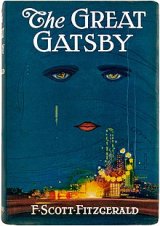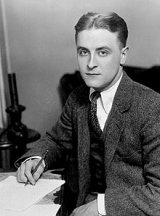The Great Gatsby Page #34
The Great Gatsby is a 1925 novel by American writer F. Scott Fitzgerald. Set in the Jazz Age on Long Island, near New York City, the novel depicts first-person narrator Nick Carraway's interactions with mysterious millionaire Jay Gatsby and Gatsby's obsession to reunite with his former lover, Daisy Buchanan. The novel was inspired by a youthful romance Fitzgerald had with socialite Ginevra King, and the riotous parties he attended on Long Island's North Shore in 1922
curious crowd around there all day with little boys searching for dark spots in the dust, and some garrulous man telling over and over what had happened, until it became less and less real even to him and he could tell it no longer, and Myrtle Wilson’s tragic achievement was forgotten. Now I want to go back a little and tell what happened at the garage after we left there the night before. They had difficulty in locating the sister, Catherine. She must have broken her rule against drinking that night, for when she arrived she was stupid with liquor and unable to understand that the ambulance had already gone to Flushing. When they convinced her of this, she immediately fainted, as if that was the intolerable part of the affair. Someone, kind or curious, took her in his car and drove her in the wake of her sister’s body. Until long after midnight a changing crowd lapped up against the front of the garage, while George Wilson rocked himself back and forth on the couch inside. For a while the door of the office was open, and everyone who came into the garage glanced irresistibly through it. Finally someone said it was a shame, and closed the door. Michaelis and several other men were with him; first, four or five men, later two or three men. Still later Michaelis had to ask the last stranger to wait there fifteen minutes longer, while he went back to his own place and made a pot of coffee. After that, he stayed there alone with Wilson until dawn. About three o’clock the quality of Wilson’s incoherent muttering changed—he grew quieter and began to talk about the yellow car. He announced that he had a way of finding out whom the yellow car belonged to, and then he blurted out that a couple of months ago his wife had come from the city with her face bruised and her nose swollen. But when he heard himself say this, he flinched and began to cry “Oh, my God!” again in his groaning voice. Michaelis made a clumsy attempt to distract him. “How long have you been married, George? Come on there, try and sit still a minute, and answer my question. How long have you been married?” “Twelve years.” “Ever had any children? Come on, George, sit still—I asked you a question. Did you ever have any children?” The hard brown beetles kept thudding against the dull light, and whenever Michaelis heard a car go tearing along the road outside it sounded to him like the car that hadn’t stopped a few hours before. He didn’t like to go into the garage, because the work bench was stained where the body had been lying, so he moved uncomfortably around the office—he knew every object in it before morning—and from time to time sat down beside Wilson trying to keep him more quiet. “Have you got a church you go to sometimes, George? Maybe even if you haven’t been there for a long time? Maybe I could call up the church and get a priest to come over and he could talk to you, see?” “Don’t belong to any.” “You ought to have a church, George, for times like this. You must have gone to church once. Didn’t you get married in a church? Listen, George, listen to me. Didn’t you get married in a church?” “That was a long time ago.” The effort of answering broke the rhythm of his rocking—for a moment he was silent. Then the same half-knowing, half-bewildered look came back into his faded eyes. “Look in the drawer there,” he said, pointing at the desk. “Which drawer?” “That drawer—that one.” Michaelis opened the drawer nearest his hand. There was nothing in it but a small, expensive dog-leash, made of leather and braided silver. It was apparently new. “This?” he inquired, holding it up. Wilson stared and nodded. “I found it yesterday afternoon. She tried to tell me about it, but I knew it was something funny.” “You mean your wife bought it?” “She had it wrapped in tissue paper on her bureau.” Michaelis didn’t see anything odd in that, and he gave Wilson a dozen reasons why his wife might have bought the dog-leash. But conceivably Wilson had heard some of these same explanations before, from Myrtle, because he began saying “Oh, my God!” again in a whisper—his comforter left several explanations in the air. “Then he killed her,” said Wilson. His mouth dropped open suddenly. “Who did?” “I have a way of finding out.” “You’re morbid, George,” said his friend. “This has been a strain to you and you don’t know what you’re saying. You’d better try and sit quiet till morning.” “He murdered her.” “It was an accident, George.” Wilson shook his head. His eyes narrowed and his mouth widened slightly with the ghost of a superior “Hm!” “I know,” he said definitely. “I’m one of these trusting fellas and I don’t think any harm to nobody, but when I get to know a thing I know it. It was the man in that car. She ran out to speak to him and he wouldn’t stop.” Michaelis had seen this too, but it hadn’t occurred to him that there was any special significance in it. He believed that Mrs. Wilson had been running away from her husband, rather than trying to stop any particular car. “How could she of been like that?” “She’s a deep one,” said Wilson, as if that answered the question. “Ah-h-h—” He began to rock again, and Michaelis stood twisting the leash in his hand. “Maybe you got some friend that I could telephone for, George?” This was a forlorn hope—he was almost sure that Wilson had no friend: there was not enough of him for his wife. He was glad a little later when he noticed a change in the room, a blue quickening by the window, and realized that dawn wasn’t far off. About five o’clock it was blue enough outside to snap off the light. Wilson’s glazed eyes turned out to the ash-heaps, where small grey clouds took on fantastic shapes and scurried here and there in the faint dawn wind. “I spoke to her,” he muttered, after a long silence. “I told her she might fool me but she couldn’t fool God. I took her to the window”—with an effort he got up and walked to the rear window and leaned with his face pressed against it—“and I said ‘God knows what you’ve been doing, everything you’ve been doing. You may fool me, but you can’t fool God!’ ” Standing behind him, Michaelis saw with a shock that he was looking at the eyes of Doctor T. J. Eckleburg, which had just emerged, pale and enormous, from the dissolving night. “God sees everything,” repeated Wilson. “That’s an advertisement,” Michaelis assured him. Something made him turn away from the window and look back into the room. But Wilson stood there a long time, his face close to the window pane, nodding into the twilight. ------------------------------------------------------------------------ By six o’clock Michaelis was worn out, and grateful for the sound of a car stopping outside. It was one of the watchers of the night before who had promised to come back, so he cooked breakfast for three, which he and the other man ate together. Wilson was quieter now, and Michaelis went home to sleep; when he awoke four hours later and
Translation
Translate and read this book in other languages:
Select another language:
- - Select -
- 简体中文 (Chinese - Simplified)
- 繁體中文 (Chinese - Traditional)
- Español (Spanish)
- Esperanto (Esperanto)
- 日本語 (Japanese)
- Português (Portuguese)
- Deutsch (German)
- العربية (Arabic)
- Français (French)
- Русский (Russian)
- ಕನ್ನಡ (Kannada)
- 한국어 (Korean)
- עברית (Hebrew)
- Gaeilge (Irish)
- Українська (Ukrainian)
- اردو (Urdu)
- Magyar (Hungarian)
- मानक हिन्दी (Hindi)
- Indonesia (Indonesian)
- Italiano (Italian)
- தமிழ் (Tamil)
- Türkçe (Turkish)
- తెలుగు (Telugu)
- ภาษาไทย (Thai)
- Tiếng Việt (Vietnamese)
- Čeština (Czech)
- Polski (Polish)
- Bahasa Indonesia (Indonesian)
- Românește (Romanian)
- Nederlands (Dutch)
- Ελληνικά (Greek)
- Latinum (Latin)
- Svenska (Swedish)
- Dansk (Danish)
- Suomi (Finnish)
- فارسی (Persian)
- ייִדיש (Yiddish)
- հայերեն (Armenian)
- Norsk (Norwegian)
- English (English)
Citation
Use the citation below to add this book to your bibliography:
Style:MLAChicagoAPA
"The Great Gatsby Books." Literature.com. STANDS4 LLC, 2025. Web. 27 Feb. 2025. <https://www.literature.com/book/the_great_gatsby_1598>.








Discuss this The Great Gatsby book with the community:
Report Comment
We're doing our best to make sure our content is useful, accurate and safe.
If by any chance you spot an inappropriate comment while navigating through our website please use this form to let us know, and we'll take care of it shortly.
Attachment
You need to be logged in to favorite.
Log In